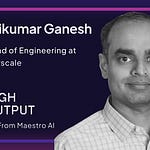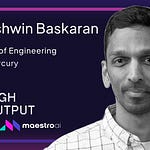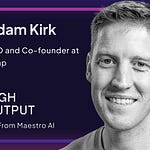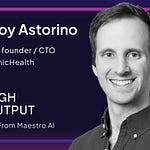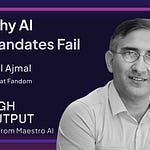Mike Weaver followed every rule in the engineering playbook.
When LLMs started disrupting Replicant's voice automation platform, he did exactly what conventional wisdom dictates: "Let's incorporate it in parts of the product. Let's improve these parts of the experience." Keep the legacy system running, gradually migrate functionality, minimize risk.
But months into this approach, Mike hit the wall every engineering leader knows: "The way that story always seems to end is the new one never launched."
That's when Mike discovered something that changed everything. AI coding tools had fundamentally altered the economics of rebuilds. "The velocity you can move at with greenfield development is just preposterous," he realized. Instead of years-long migrations that typically fail, his team could rebuild Replicant's core platform in 90 days with 12 people.
The result? They "threw things away and started over"—successfully. This breakthrough demonstrates how AI fundamentally changes the strategic calculus for engineering leaders.
This reveals what most leaders are missing: AI fundamentally changes the strategic calculus of engineering decisions. Before AI coding tools, engineering leaders faced an impossible choice—keep maintaining legacy systems that block innovation, or attempt risky, years-long rebuilds that usually fail. AI creates a new strategic option: rebuilds that are both fast and low-risk, fundamentally shifting how leaders think about technical debt and resource allocation.
🎧 Subscribe and Listen Now →
The Demand Multiplier Nobody Talks About
Here's what Mike discovered at Replicant: AI doesn't reduce the need for engineers—it multiplies what's economically possible to build.
Mike started programming in the late '80s with BBSs, graduated during the dot-com boom, and learned hardcore C++ from "absolute badasses" who came out of Bell Labs. Over 16 years of engineering leadership, he's seen every technology wave—and this one is different.
"The overall need and desire for software in the world just seems to completely outstrip supply," he told me. "I just don't see” AI killing software jobs. “It'll just be more software."
"I was just talking to a guy today who runs this gym that I work at," Mike explained. "He says he cannot find any software anywhere that will do this biomechanics type analysis that he wants to do. They do motion capture on people who work out there to analyze all this stuff about how their performance is and create custom workout plans for them."
Mike's reaction: "How does that not exist? Like all that, none of that technology is like hard to do. Like the motion capture stuff's all figured out. It's just sort of a data munging application with like a UI and some ML in there."
The answer: "I think it's just 'cause the market's too small."
But here's the insight: "If you change the economics, maybe not."
This is the job creation mechanism nobody sees. AI isn't replacing engineers—it's making thousands of niche markets suddenly viable. Software that was too expensive to build for small markets becomes profitable when development costs drop 10x.
Why Companies Do More, Not Hire Less
Mike's experience challenges the conventional wisdom about AI-driven downsizing. When I asked if he thought people would still have engineering jobs, his response was immediate:
"I do, I do. I think there's this whole talk about companies will be smaller. I just think companies are just gonna do more."
He made it concrete: "If you're at a startup right now. How long is your to-do list? Like if I double the size of your engineering team tomorrow, would you have stuff for them to do? Yes."
This matches what Mike saw at Replicant. With AI tools like Cursor, his team rebuilt their entire conversation automation platform in 90 days—something that would have taken two years before. The result wasn't fewer engineers. It was more ambitious product goals and rapid team growth.
"There's so many parts of the business world, the industrial world, that have not really been penetrated by technology," Mike observed. "Those are all ripe for people to go in there and do it."
The Skills That Matter More
Mike sees the real challenge differently than most. It's not about AI replacing engineers—it's about engineers adapting to work effectively with AI tools.
"Experienced engineers who can use those tools, have experience with the tools as well—'cause I think it takes, there's some learning curve to get the most out of them—can just produce an enormous quantity of reasonable quality software very, very quickly."
But the bigger shift is social, not technical. "As you become a more senior engineer, I see it's all about communication," Mike explained. "There's only so much you can get done as an individual. And then you need to go outside yourself."
With AI handling more routine coding, human coordination becomes the bottleneck. "If everyone can produce code at four times the rate they used to, it's like, okay, well now, there are no more solo projects. You're gonna have to coordinate."
What This Means for You
Mike's experience reveals four principles for engineering leaders preparing for the AI-driven future:
First, stop asking whether AI will replace engineers. Start asking what becomes possible when engineering costs drop dramatically. The constraint isn't demand for software—it's our ability to build it economically. AI removes that constraint.
Second, embrace the rebuild option. Mike's 90-day platform rebuild would have been impossible before AI coding tools. If you're carrying technical debt from pre-AI architectures, the cost-benefit analysis of rebuilds has fundamentally changed.
Third, invest in communication skills across your team. "I think the only challenge junior engineers are gonna have is that their expectations will be higher, quicker," Mike noted. When AI handles routine coding, human coordination becomes the new bottleneck.
Fourth, think about untapped markets, not just optimization. Mike's gym example illustrates thousands of niche applications that were previously uneconomical. The next decade belongs to engineers who can identify and serve these newly viable markets.
The question for your next strategic decision: Instead of asking "How do we stay competitive?" ask "What becomes possible now that wasn't possible before?"
High Output is brought to you by Maestro AI. Mike talked about how AI tools let his team "produce an enormous quantity of reasonable quality software very, very quickly"—but that speed creates a new challenge. When your team can build 4x faster, staying aligned on what you're actually building becomes critical. Maestro cuts through the noise with daily briefings that reveal where your team's time and energy actually go, so you can spot when that increased velocity is pointing in the wrong direction.
Visit https://getmaestro.ai to see how we help engineering leaders maintain alignment in the age of acceleration.
Have your own story about AI changing your engineering strategy? We'd love to hear it. Schedule a chat with our team → https://cal.com/team/maestro-ai/chat-with-maestro



